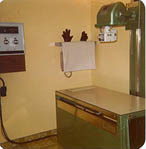|
Featured
Article
What's
New In Veterinary Medicine
by Dr. Joe Cortese
 Since
I graduated from veterinary school thirty years
ago, there have been tremendous advances in the
treatment of our companion animals. I thought
it would be interesting to highlight some of those
more dramatic breakthroughs. Since
I graduated from veterinary school thirty years
ago, there have been tremendous advances in the
treatment of our companion animals. I thought
it would be interesting to highlight some of those
more dramatic breakthroughs.
Parasite
Control: For those of you that have had pets
for many years I'm sure that you remember the
old days of flea powders, dips, shampoos, bombs,
etc...Probably one of the greatest innovations
to come along has been the advent of the once-a-month
pills and topical applications for fleas and other
parasites. Advantage and Frontline are two revolutionary
products that are applied topically on a monthly
basis and are extremely effective at killing adult
fleas for at least one month. In addition, Frontline
is also effective against ticks. These two topical
agents are joined by Sentinel, a once-a-month
pill that prevents heartworms, whipworms, roundworms,
hookworms and aids in the control of the flea
life cycle. For our feline friends, Program, which
renders fleas sterile, is now available as an
injection that lasts for six months! If your pet
is not on one of these products, I would suggest
a visit to your veterinarian before the flea season
starts this spring.
New
Technology: Some of the most exciting advances
in veterinary medicine have come in the area of
diagnostic imaging, It is now common for general
small animal veterinary hospitals to have ultrasound
machines. In animals, ultrasound is often used
to evaluate the heart and measure its function.
In addition, abdominal organs can be evaluated
for disease and biopsied under the guidance of
the ultrasound machine. This technology has in
many instances eliminated the need for exploratory
surgery, CAT scans, MRI exams can also be obtained
at several locations in Southern California. In
the area of blood analysis, most small animal
hospitals now have complete "in house" labs so
that blood work can be run and the results obtained
within minutes.
Anesthesia
& Monitoring: Thanks to recent advances in
anesthesia monitoring equipment and newer agents
and techniques, the incidence of anesthetic reactions
has been greatly reduced. It is now common practice
to monitor our patients with pulse oximetry, which
detects oxygen saturation in the blood. In addition,
dopplers are often used to monitor pulse quality
and blood pressure. EKG's are often employed as
well as CO2 breathing monitors. Coupled with these
advances in monitors there have been numerous
new anesthetic agents developed over the last
10 years. New state-of-the-art agents include
Isoflurane gas and Propofol for anesthetic induction.
Even tranquilizers have been improved and now
come with agents to reverse their effects so pets
don't need to leave the hospital in a drugged
state.
Surgery:
In the area of surgical advancements probably
the greatest strides have been made in orthopedics
and the management of hip dysplasia, a procedure
called a triple pelvic ostectomy can be performed.
In this surgery the pelvis is cut and rotated
so that the ball of the hip fits snugly into the
socket. In more advanced cases a totla hip replacement
is performed. Just like in people a completely
artificial joint made from metal is implanted.
This surgery has been greatly perfected over the
years and now represents a real alternative for
the dog crippled with hip dysplasia.
Veterinary
Specialist: Thirty years ago veterinary specialization
was in its infancy. Almost all board-certified
specialists were found in universities. Now veterinarians
can become specialized in surgery, internal medicine,
radiology, opthamology, cardiology, oncology and
even general practice by the species that they
work on! Many specialists are now found in private
practice and work closely with your family veterinarian
on those difficult-to-manage cases.
In
conclusion, it is easy to see that the quality
of medicine and surgery available to our pets
has become very sophisticated. The real winner
in this has been our pets and the quality of care
that they receive
© Copyright 2002 Purpose Media
and Dr.
Joe Cortese. No unauthorized duplication without
written consent.
|



![]()
 Since
I graduated from veterinary school thirty years
ago, there have been tremendous advances in the
treatment of our companion animals. I thought
it would be interesting to highlight some of those
more dramatic breakthroughs.
Since
I graduated from veterinary school thirty years
ago, there have been tremendous advances in the
treatment of our companion animals. I thought
it would be interesting to highlight some of those
more dramatic breakthroughs.